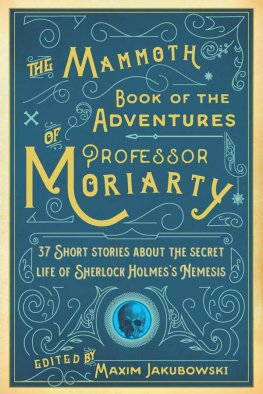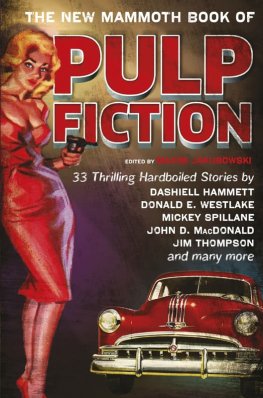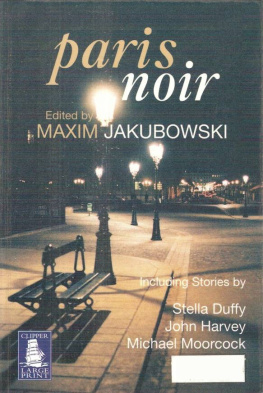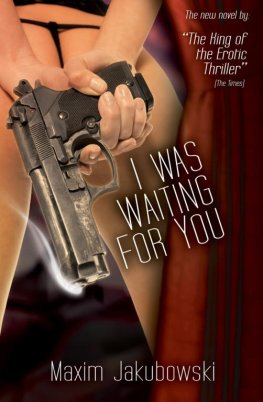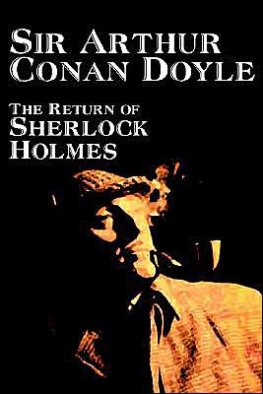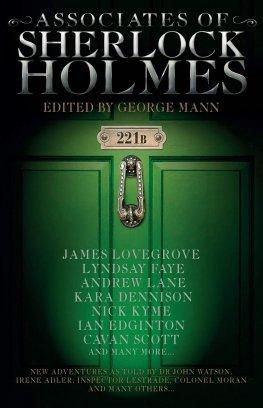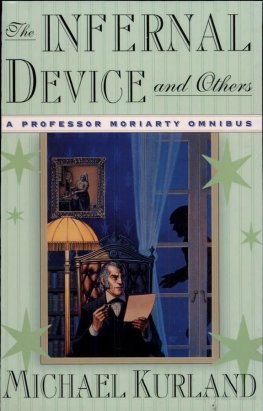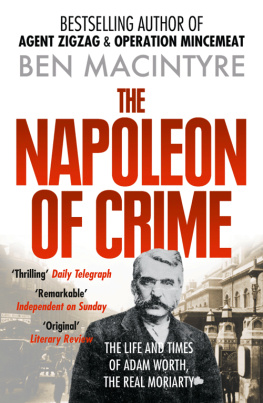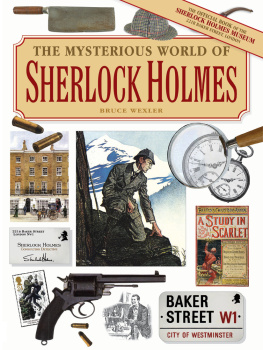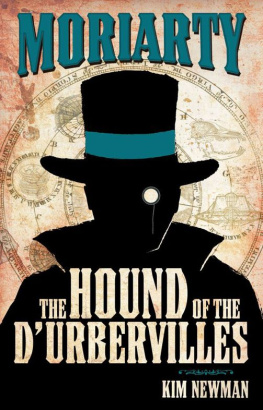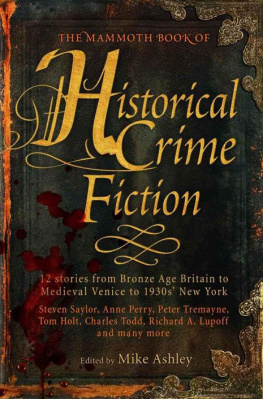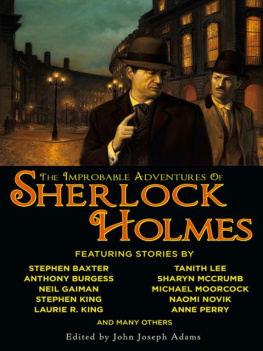The Mammoth Book of the Adventures of Professor Moriarty
37 Short Stories about the Secret Life of Sherlock Holmes's Nemesis
Edited by Maxim Jakubowski
Introduction
Maxim Jakubowski
It is said that the devil has all the best lines and who are we to contradict this?
Heroes come, triumph against terrible adversity and eventually end up in the land of happy-ever-after, but you and I know that the baddies are more often the ones that stay in the mind. In books, movies, comics and, less seductively, also sometimes in real life.
Of course, we all remember James Bonds exploits, but its the larger than life figures of Auric Goldfinger, Ernst Stavro Blofeld, Doctor No, Oddjob, Jaws and other representations of evil who come to mind. Think back: Hannibal Lecter, the Joker, Lex Luthor, Hyde on the dark side of Jekyll, Jack the Ripper, Fu Manchu, the Deaf Man in Ed McBains 87th Precinct police procedurals, Long John Silver, Captain Hook, Tom Ripley Patricia Highsmiths chilling but suave killer and manipulator Bill Sykes, Sauron, Patrick Bateman the anti-hero of American Psycho Dracula, Voldermort, the list could prove endless.
I rest my case.
No one will object to my stating that Sherlock Holmes is the most legendary of fictional sleuths and still captures our imagination like no other through renewed interpretations, impersonations and tales still being spun well beyond Conan Doyles initial canon. But what would Sherlock be without his arch foe: Professor James Moriarty, a man whose fate and life is intimately entwined with his and who automatically comes to mind whenever we evoke the denizen of 221B Baker Street?
But unless you are a learned Holmes expert, did you know that Moriarty actually only appears in two Holmes stories? Respectively, The Adventure of the Final Problem and The Valley of Fear.
Holmes, or rather his chronicler Doctor Watson, evokes Moriarty in passing in five other tales but the master criminal, whom Holmes described as the Napoleon of Crime doesnt in fact appear in the stories (The Adventure of the Empty House, The Adventure of the Norwood Builder, The Adventure of the Missing Three-Quarter, The Adventure of the Illustrious Client and His Last Bow).
Doctor Watson, even when narrating, never meets Moriarty (only getting distant glimpses of him in The Final Problem), and relies upon Holmes to relate accounts of the detectives feud with the criminal. Conan Doyle is inconsistent on Watsons familiarity with Moriarty. In The Final Problem, Watson tells Holmes he has never heard of Moriarty, while in The Valley of Fear, set earlier on, Watson already knows of him as the famous scientific criminal.
On such thin foundations was a legend born!
And scores of readers starved of further stories about Moriarty (and by extension Sherlock Holmes) have incessantly called out for more and writers have obliged. Prominent amongst these have been Michael Kurland, the much-missed John Gardner, and Anthony Horowitz, all of whose novels featuring the master criminal have provided a renewed light and insights into his nefarious, if clever activities.
Which is where this collection comes in.
Aware of the fascination Moriarty casts, I thought the time had come for our criminal mastermind to have an anthology of his own, and the submissions came flooding in, enough to fill several volumes of our size! So many admirers of crime out there!
The short stories I had the privilege of assembling prove so wondrously imaginative and challenging. Not all feature Holmes or Watson, and not all see Moriarty as the pure incarnation of evil we had previously assumed he represented, and the twists and adventures on offer are often a thing of beauty. The variations on display are both subtle and far-fetching, filling the gaps in the Doyle canon or opening up whole new cans of worms, which I found as delightful as they were challenging.
Inside these pages you will find well-known crime writers, and lesser stars too, as well as courageous interlopers from other popular fiction fields such as science fiction and fantasy and even erotica (albeit with their libido switched off for the occasion), all seduced by the attraction of Professor James Moriartys criminal mind.
Never has evil been so fascinating and its fruit so exciting.
The games afoot yet again.
Relish!
Maxim Jakubowski
Moriarty and the Two-Body Problem
Alison Joseph
It seems rather odd now, looking back, that I didnt see the shape of things. Given that, as a mathematician, seeing the shape of things is what I do, finding order instead of chaos, a pattern where once was randomness. As Professor Moriarty might have said but, no, I must start at the beginning.
They were happy times. It was a small college in London, and I was embarking on my research under the supervision of Professor James Moriarty. My father, a pharmacist in Norwich, couldnt understand what had made me leave the security of Cambridge to end up in London, working with someone no one had heard of. But Im working on Gauss, I tried to tell my parents. Carl Friedrich Gauss, who charted the path of the comet Ceres where everyone else had failed. I knew that Professor Moriarty had been feted in his day for his influential work on the dynamics of an asteroid. And now here he was, tucked away in London, in a small room in St Dunstans College, still knowing more about Gausss calculations than anyone other than Gauss himself.
I cant imagine why youve come to me, young man, were his first words when I introduced myself. Once, long ago, I might have had some influence, but were in the twentieth century now. My work no longer carries any weight. Where once my name struck fear into my enemies, why now, no one has heard of me at all. Then, with a brief, thin smile he said, I have no enemies now. His gaze had somehow gone beyond me, into the distance, into the past.
Above him hung a portrait, and my eyes were drawn to it. It was clearly the Professor himself, as a younger man. Even now one could see the similarities. He looked more distinguished, older, of course, but the grey hair was still thick, the same domed forehead, the same rather stiff, upright posture. Next to it there was a charming painting of a boy, sitting at a table upon which lay various mathematical instruments. Moriartys gaze followed mine.
Le Petit Mathmaticien, he said.
French? I said.
Greuze, he said.
Im afraid I dont know who that is, I said.
He laughed. Its a copy. I do have an original Greuze, but in the past certain people made rather, shall we say, unfortunate judgements about me for having such a valuable thing, so I keep it to myself. Now, young man, tell me why youre so keen to allow an old has-been any kind of influence over your work.
I began to describe my work. I talked about orbits within solar systems, the measurement of the angle between two planes, and the measurement of the arc intercepted between the poles of the curves, and, as I talked, I noticed how his expression carried a blankness, almost a sneer. I wondered whether perhaps my parents were right, and that staying in the confines of Emmanuel with a tutor I knew well might have been a more rational decision.
But what my parents didnt yet know was that I had encountered Angela, a lovely librarian who worked in the university and lived with her widowed father in Harrow; and I had resolved that, if staying in London gave me the chance to see more of her, then London it would be. What they also didnt know was that I had taken a part-time job in a printers warehouse in Holborn just to keep a roof over my head. I occupied two small rooms near Chancery Lane, where at night I would lie in bed listening to the rain dripping from the broken guttering and the shouts of unruly law students in the streets below.

